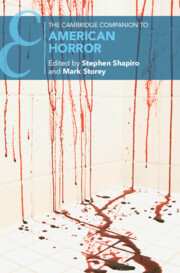Book contents
- The Cambridge Companion to American Horror
- The Cambridge Companion to American Horror
- Copyright page
- Contents
- Acknowledgments
- Contributors
- Introduction
- Part I Histories
- 1 Slavery
- 2 Capitalism
- 3 Religion and Spirituality
- 4 Settlement and Imperialism
- 5 Censorship and State Regulation
- 6 Schlock, Kitsch, and Camp
- Part II Genres
- Index
- Cambridge Companions To …
- References
6 - Schlock, Kitsch, and Camp
from Part I - Histories
Published online by Cambridge University Press: 21 July 2022
- The Cambridge Companion to American Horror
- The Cambridge Companion to American Horror
- Copyright page
- Contents
- Acknowledgments
- Contributors
- Introduction
- Part I Histories
- 1 Slavery
- 2 Capitalism
- 3 Religion and Spirituality
- 4 Settlement and Imperialism
- 5 Censorship and State Regulation
- 6 Schlock, Kitsch, and Camp
- Part II Genres
- Index
- Cambridge Companions To …
- References
Summary
Schlock horror is excessive, gore-filled, aiming for great effects and intense emotions. It might harbor pretentions to deadly seriousness, but cannot achieve its aim. It usually fails, because something rings untrue, too silly, be it the acting, the scriptwriting, the sets, the too-bright red blood. Schlocky horror has long been a part of the genre, but its presence waxes and wanes across time, according to technological demands within the culture industry or vagaries of fashion. Reversals occur. Artworks that were designed more or less earnestly might come to be seen as schlocky, while artworks designed to become cult objects of bad taste might find themselves elevated into the zone of high art. Any consideration of schlock benefits from an assessment of the longer history of its associated (anti)-aesthetic terms: kitsch and camp – in order to discern how various cultural critics have derived social and political and other meaning from what are often disdained productions.
- Type
- Chapter
- Information
- The Cambridge Companion to American Horror , pp. 91 - 104Publisher: Cambridge University PressPrint publication year: 2022



